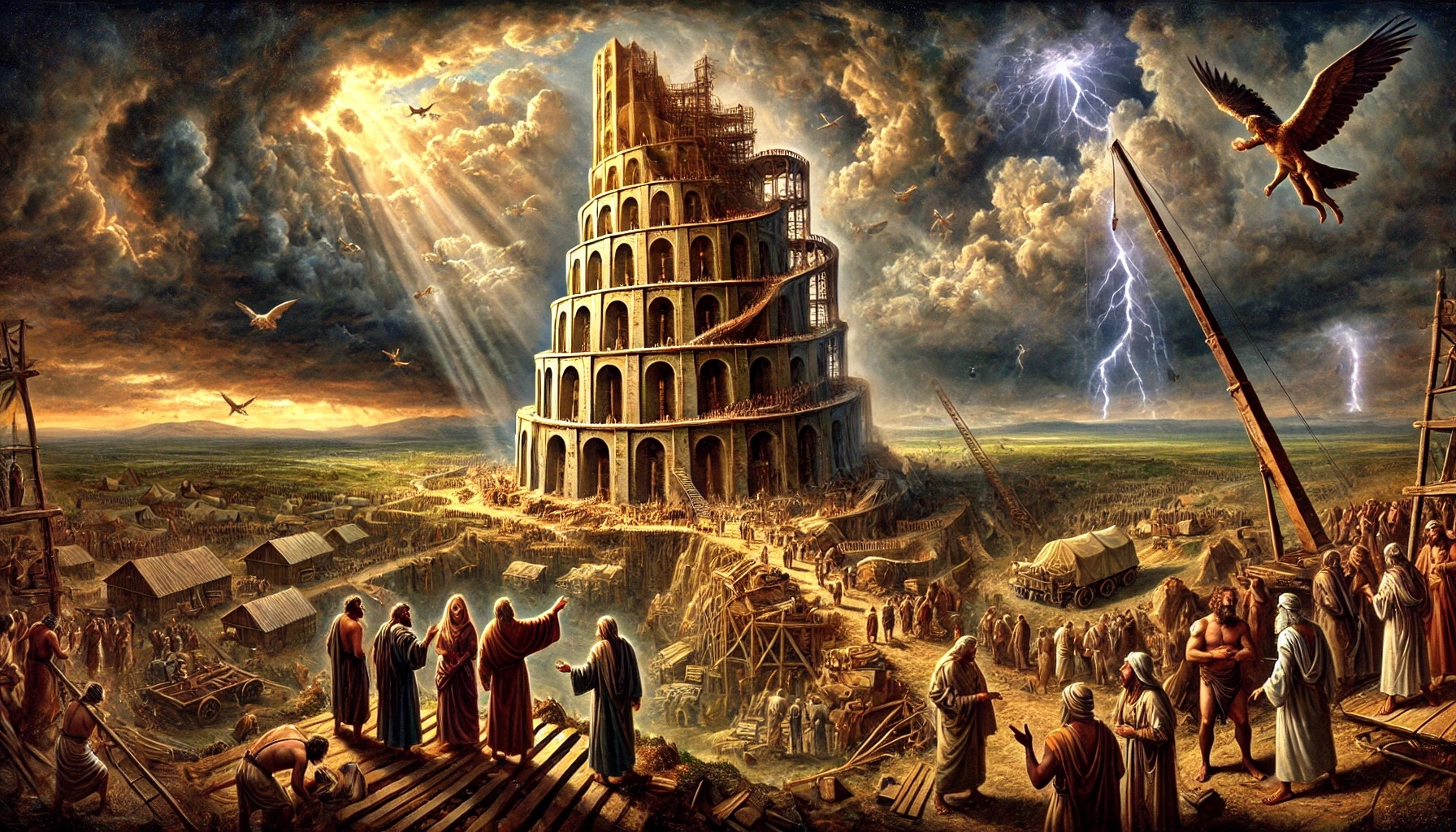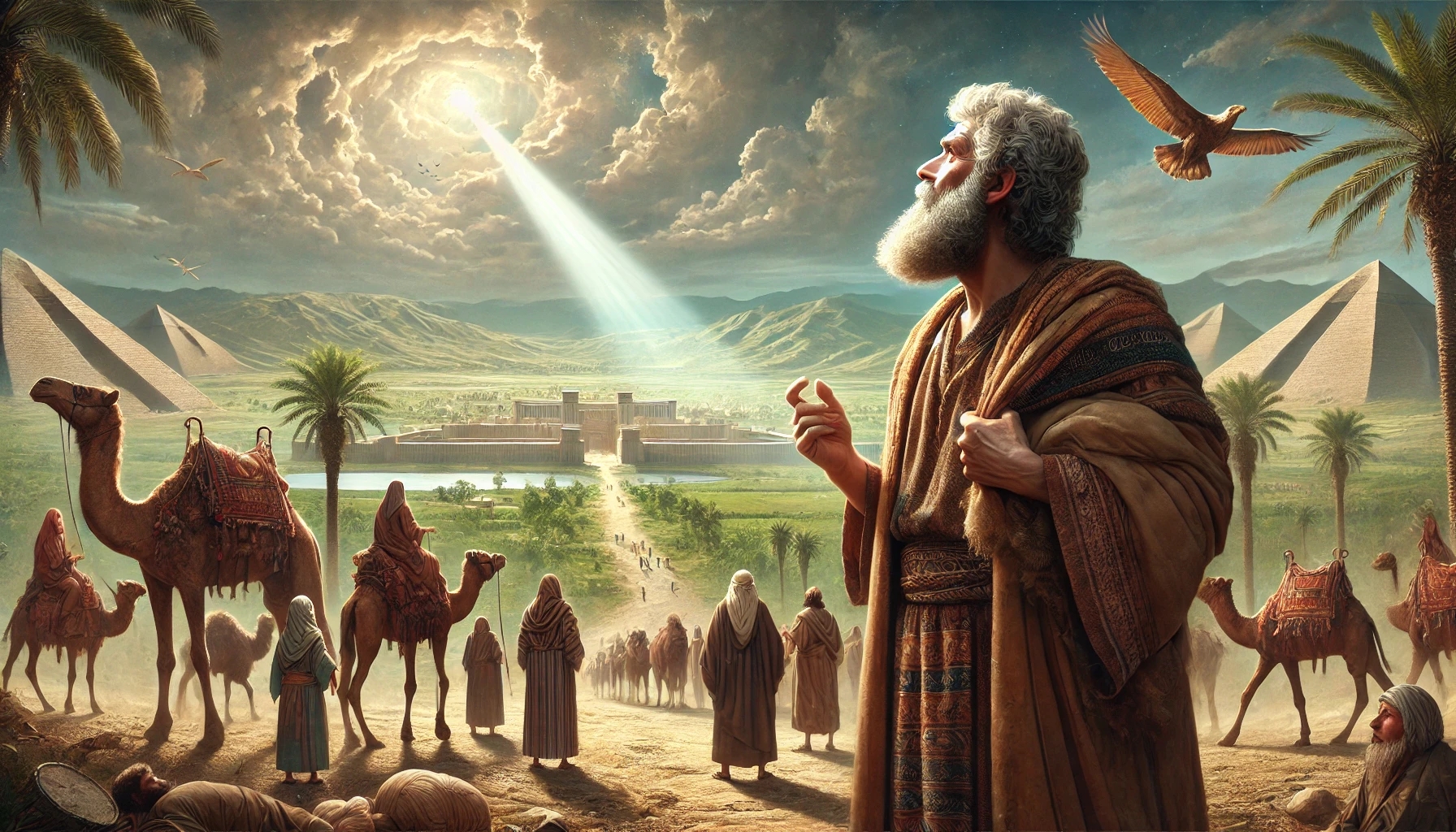11. 06.2025 – Exodus Chapter 6 | BELIEVE HIS PROPHETS

📅 June 11, 2025
📖 DAILY BIBLE READING
✨ Exodus 6 – The Commission Renewed – God Affirms His Promise and Power
⛺ When God’s plan continues despite human doubts – hope and calling amid burden and suffering.
══════════════════════════════════════════════
📜 Bible Text – Exodus 6 (KJV)
Then the Lord said unto Moses, Now shalt thou see what I will do to Pharaoh: for with a strong hand shall he let them go, and with a strong hand shall he drive them out of his land.
2 And God spake unto Moses, and said unto him, I am the Lord:
3 And I appeared unto Abraham, unto Isaac, and unto Jacob, by the name of God Almighty, but by my name Jehovah was I not known to them.
4 And I have also established my covenant with them, to give them the land of Canaan, the land of their pilgrimage, wherein they were strangers.
5 And I have also heard the groaning of the children of Israel, whom the Egyptians keep in bondage; and I have remembered my covenant.
6 Wherefore say unto the children of Israel, I am the Lord, and I will bring you out from under the burdens of the Egyptians, and I will rid you out of their bondage, and I will redeem you with a stretched out arm, and with great judgments:
7 And I will take you to me for a people, and I will be to you a God: and ye shall know that I am the Lord your God, which bringeth you out from under the burdens of the Egyptians.
8 And I will bring you in unto the land, concerning the which I did swear to give it to Abraham, to Isaac, and to Jacob; and I will give it you for an heritage: I am the Lord.
9 And Moses spake so unto the children of Israel: but they hearkened not unto Moses for anguish of spirit, and for cruel bondage.
10 And the Lord spake unto Moses, saying,
11 Go in, speak unto Pharaoh king of Egypt, that he let the children of Israel go out of his land.
12 And Moses spake before the Lord, saying, Behold, the children of Israel have not hearkened unto me; how then shall Pharaoh hear me, who am of uncircumcised lips?
13 And the Lord spake unto Moses and unto Aaron, and gave them a charge unto the children of Israel, and unto Pharaoh king of Egypt, to bring the children of Israel out of the land of Egypt.
14 These be the heads of their fathers’ houses: The sons of Reuben the firstborn of Israel; Hanoch, and Pallu, Hezron, and Carmi: these be the families of Reuben.
15 And the sons of Simeon; Jemuel, and Jamin, and Ohad, and Jachin, and Zohar, and Shaul the son of a Canaanitish woman: these are the families of Simeon.
16 And these are the names of the sons of Levi according to their generations; Gershon, and Kohath, and Merari: and the years of the life of Levi were an hundred thirty and seven years.
17 The sons of Gershon; Libni, and Shimi, according to their families.
18 And the sons of Kohath; Amram, and Izhar, and Hebron, and Uzziel: and the years of the life of Kohath were an hundred thirty and three years.
19 And the sons of Merari; Mahali and Mushi: these are the families of Levi according to their generations.
20 And Amram took him Jochebed his father’s sister to wife; and she bare him Aaron and Moses: and the years of the life of Amram were an hundred and thirty and seven years.
21 And the sons of Izhar; Korah, and Nepheg, and Zichri.
22 And the sons of Uzziel; Mishael, and Elzaphan, and Zithri.
23 And Aaron took him Elisheba, daughter of Amminadab, sister of Naashon, to wife; and she bare him Nadab, and Abihu, Eleazar, and Ithamar.
24 And the sons of Korah; Assir, and Elkanah, and Abiasaph: these are the families of the Korhites.
25 And Eleazar Aaron’s son took him one of the daughters of Putiel to wife; and she bare him Phinehas: these are the heads of the fathers of the Levites according to their families.
26 These are that Aaron and Moses, to whom the Lord said, Bring out the children of Israel from the land of Egypt according to their armies.
27 These are they which spake to Pharaoh king of Egypt, to bring out the children of Israel from Egypt: these are that Moses and Aaron.
28 And it came to pass on the day when the Lord spake unto Moses in the land of Egypt,
29 That the Lord spake unto Moses, saying, I am the Lord: speak thou unto Pharaoh king of Egypt all that I say unto thee.
30 And Moses said before the Lord, Behold, I am of uncircumcised lips, and how shall Pharaoh hearken unto me?
══════════════════════════════════════════════
🔵 Introduction
Chapter 6 of Exodus is a powerful turning point in Israel’s deliverance story. After the bitter disappointment at the end of chapter 5—where Moses accused God of making the people’s oppression even worse—God responds not with rebuke, but with a fresh affirmation of His promises. He speaks to Moses not merely as a commander, but as the covenant-keeping God who has not forgotten His pledges to Abraham, Isaac, and Jacob.
This chapter highlights two major themes: God’s faithfulness and Moses’ calling despite his own weakness. It speaks of hope, divine guidance in the midst of human despair, and the reliability of God’s word.
══════════════════════════════════════════════
🟡 Commentary
I. God’s Renewed Promise to Moses (Verses 1–8)
God speaks with clarity and power: “Now you will see what I will do to Pharaoh” (v. 1). This “now” marks a decisive shift. He points Moses away from his feelings or prospects for success to His own sovereign might. The promise to redeem Israel “with an outstretched arm and great acts of judgment” is concrete, not merely symbolic.
He reveals Himself as “the LORD” (YHWH)—a deeper self-revelation showing He is the God who acts personally and dwells with His people. While Abraham, Isaac, and Jacob knew Him as God Almighty (El Shaddai), Moses and Israel are invited to experience Him as the covenant-keeping YHWH—faithful, present, and liberating.
II. Israel’s Response (Verse 9)
Despite these mighty assurances, the people do not rejoice. “They did not listen because of their discouragement and harsh labor.” This poignant image of human brokenness shows how burdens can be so heavy that even God’s promises fail to reach our hearts.
Yet the text notes: God’s promises remain true even when they are not felt or believed in the moment.
III. Moses Sent Again—And Doubts Again (Verses 10–13)
God is undeterred. He commissions Moses once more to speak with Pharaoh. Moses again protests, “I am of uncircumcised lips”—a metaphor for inadequacy or unworthiness. God does not simply dismiss his excuse; He appoints Aaron alongside Moses and reiterates the command. The focus is not on Moses’ ability, but on God’s power.
IV. The Genealogy of the Levites (Verses 14–27)
What seems like a dry list serves a vital purpose: it authenticates Moses and Aaron as God’s chosen leaders from the house of Levi, especially through Amram. This genealogy prevents any notion that Moses was a self-appointed prophet—his lineage confirms God’s preparation and commission. It underscores that God’s call is rooted in history, order, and covenant.
V. Final Affirmation of the Commission (Verses 28–30)
The chapter closes by echoing the earlier commission scene (v. 10). Moses again claims his “uncircumcised lips,” but by now it is clear: God’s plan will proceed despite human weakness. The emphasis falls on obedience in spite of inadequacy.
══════════════════════════════════════════════
🟢 Summary
God reaffirms His intent to deliver Israel from slavery by powerful acts. Despite the people’s discouragement and Moses’ doubts, God’s plan remains unshaken. He reveals Himself as the covenant-keeping God who remembers His promises. The Levite genealogy legitimizes Moses and Aaron’s leadership. Ultimately, the chapter teaches that God uses broken vessels to accomplish great things—because He is faithful, not because we are perfect.
══════════════════════════════════════════════
🔴 Message for Today
-
God’s promises endure, even when we don’t immediately sense them. In suffering and fatigue, His hand is still at work on our behalf.
-
You don’t have to be perfect to be used by God. Moses doubted and felt inadequate, yet he was God’s chosen instrument. God equips those He calls.
-
Faith grows by hearing, not by sight. Israel’s exhaustion silenced their ears, but God’s Word remains effective—it calls out to you even when you struggle to believe.
-
God’s guidance is woven through history. He acts not in a vacuum but through generations. You, too, belong to a larger story of His redemptive work.
~~~~~⛺~~~~~

📆 June 8 – 14, 2025
📆 WEEKLY SPIRIT OF PROPHECY READING
📖 Ellen G. White │ Patriarchs and Prophets – Chapter 10
✨ The Tower of Babel
📖 Read online here
══════════════════════════════════════════════
🔵 Introduction
After the Flood, Noah’s family was to repopulate the cleansed earth. But soon Shem, Ham, and Japheth revealed distinct character traits that persisted in their descendants. At the center stands the sinful building project on the plain of Shinar: a city with a tower meant to reach the heavens. God’s intervention by confusing their language halted construction and simultaneously fulfilled His plan to scatter humanity across the earth.
══════════════════════════════════════════════
🟡 Commentary
1. Background and Noah’s Prophecy
1.1 The Three Sons and Their Lines
-
-
Noah’s blessing on Shem and Japheth versus his curse on Canaan.
-
Inherited traits: godliness in Shem’s descendants; corruption in Ham’s line.
-
1.2 Consequences for Their Descendants
-
-
Shem: God’s chosen people and heirs of the covenant.
-
Japheth: Participants in the blessings of the Gospel.
-
Canaan: Degeneration into pagan idol worship and eventual slavery.
-
2. Settlement in Shinar and the Tower Construction
2.1 Reasons for Unity and Building
-
-
Desire for security and unity after a shared history.
-
Fertile land and a false sense of independence from divine threat.
-
2.2 Architecture as a Symbol of Power and Religion
-
-
The city as the center of a future world empire.
-
The tower as a monument to human wisdom, security, and idol worship.
-
2.3 Motives and Misbelief
-
-
Doubt in God’s promise: “No further Flood will come.”
-
Quest for scientific “understanding” of the Flood’s causes.
-
3. God’s Intervention and Judgment
3.1 Confusion of Languages
-
-
The relay system of communication collapses.
-
Complete dispersion through incomprehensible speech.
-
3.2 Destruction of the Structure and Scattering
-
-
A lightning strike as a sign of divine displeasure.
-
Fulfillment of God’s original plan: distribution of nations and languages.
-
4. Theological Significance
-
A warning against human arrogance and estrangement from God.
-
Demonstration of God’s patience, mercy, and righteous judgment through history.
-
A foreshadowing of later “Babel” phenomena: unity apart from God’s Word leads to chaos.
══════════════════════════════════════════════
🟢 Summary
The Tower of Babel illustrates how human pride and the attempt to unite independently of God lead to confusion, dispersion, and divine judgment. God’s intervention preserved His original design to fill the earth with diverse nations and languages.
══════════════════════════════════════════════
🔴 Message for Us Today
“Babel” projects still exist: ideologies that challenge God’s authority and promise unity apart from biblical truth. We are reminded to align our plans with God’s Word and to approach His sovereignty with humility.
══════════════════════════════════════════════
💬 Reflection Question
What “towers” are we building today—in technology, culture, or religion—that draw us away from God? How can we foster genuine unity through obedience to truth?
~~~~~⛺~~~~~

📆 June 8 – 14, 2025
📆 WEEKLY SPIRIT OF PROPHECY READING
📖 Ellen G. White │ Patriarchs and Prophets – Chapter 11
✨ The Tower of Babel
📖 Read online here
══════════════════════════════════════════════
🔵 Introduction
After the Babel dispersion and worldwide idolatry, God chose Abraham from Shem’s line to preserve His law and promises for future generations. Born into a family surrounded by pagan superstitions, Abraham faithfully responded to God’s call and thus became the father of the nation from which the Savior of the world would come.
══════════════════════════════════════════════
🟡 Commentary
1. Historical and Theological Background
1.1 The World after Babel
-
-
Idolatry spreads and people turn away from God.
-
God allows the unrepentant to follow their own paths.
-
1.2 Shem’s Line and the Preservation of Faith
-
-
A continuous transmission of divine revelations from Adam through Noah and Shem.
-
Abraham as heir of this sacred heritage.
-
2. God’s Promise to Abraham
2.1 Promises and Conditions
-
-
Many descendants and a great name.
-
Through him, all nations on earth will be blessed.
-
2.2 Testing through Obedience
-
-
The command to leave his homeland and relations.
-
Faith described as “the assurance of things hoped for, the conviction of things not seen.”
-
3. Abraham’s Responses and Experiences
3.1 Departure for Haran and Canaan
-
-
Obediently sets out into the unknown, accompanied by relatives and Lot.
-
Key stops: Haran as a temporary home, then Shechem and Bethel—each marked by an altar.
-
3.2 Life and Trials in Canaan
-
-
A fertile land occupied by pagans with their altars.
-
Abraham builds altars to signify God’s presence.
-
3.3 Famine and Flight to Egypt
-
-
A test of humility, patience, and faith.
-
Abraham’s lapse of faith: presenting Sarah as his sister.
-
3.4 God’s Protection and Lessons Learned
-
-
Pharaoh is afflicted by plagues, then honors Abraham.
-
Lessons about God’s safeguarding and the consequences of human distrust.
-
4. Theological Insights
-
True faith requires leaving behind familiar securities.
-
Trials serve to purify character and prepare for God’s work.
-
God’s promises remain steadfast despite human shortcomings.
══════════════════════════════════════════════
🟢 Summary
God called Abraham to leave a pagan environment and follow Him in faith. Abraham obeyed, faced tests in Canaan and Egypt, yet remained faithful despite his mistakes. In doing so, he laid the foundation for the chosen people and revealed God’s protection and patience.
══════════════════════════════════════════════
🔴 Message for Us Today
We too are invited to trust God’s promises and may be called to leave our comfort zones. Trials expose our weaknesses, but they also shape our character and demonstrate God’s faithfulness even in our failures.
══════════════════════════════════════════════
💬 Reflection Question
What “callings” from God in your life might require stepping into uncertainty and making sacrifices? How can you express your faith through obedience and trust in your daily life?




















